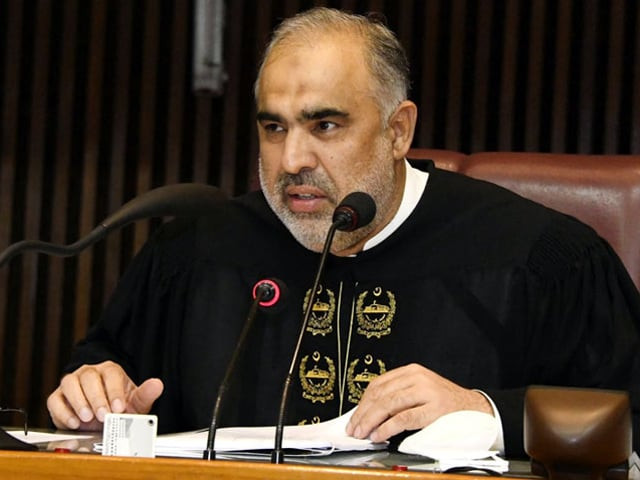NA session put off sans tabling of no-trust
Opposition outraged over adjournment

National Assembly Speaker Asad Qaiser on Friday adjourned the proceedings of the much-anticipated session till March 28 (Monday) without the tabling of the opposition parties’ no-confidence motion against Prime Minister Imran Khan.
This move irked the opposition parties to issue a warning to the speaker that any further delay in tabling of the motion would lead to protest. The session began with the recitation of the Holy Quran and prayers for late MNA Khayal Zaman, former president Rafiq Tarar and Senator Rehman Malik. However, the NA speaker announced that it would be adjourned in light of the parliamentary convention.
It is parliamentary convention that the first sitting after the death of an MNA is limited to prayers for the soul of the departed and tributes other lawmakers wish to pay them. The NA speaker said that according to the tradition, the agenda was deferred to the next day when a member of the lower house had passed away.
"This has happened for years," he said, adding that this had occurred 24 times in the past. He once again asserted that he would conduct proceedings "as per rules and procedures" after which he adjourned the session till 4pm on March 28. Around 150 opposition lawmakers and over 50 treasury members attended the session, but the exact numbers could not be ascertained.
The ruling PTI's Shah Mahmood Qureshi, Shireen Mazari, Asad Umar and Ali Muhammad Khan were among those attending the session, as well as Grand Democratic Alliance's Dr Fahmida Mirza.
From the opposition ranks, Leader of the Opposition in the National Assembly Shehbaz Sharif, PPP
Chairman Bilawal Bhutto-Zardari and PPP Co-Chairperson Asif Ali Zardari, were also present.
A day earlier, the NA Secretariat had issued a 15-point ‘Orders of the Day’ for the session that included the no-confidence motion.
Federal Information Minister Fawad Chaudhry, who had earlier told a local publication that there was no plan to adjourn the session, took to Twitter to state that "nothing would happen" during the sitting on Friday.
On March 8, the united opposition front had filed a requisition for a no-confidence motion against PM Imran, pinning its hopes for its success on the estranged members of the ruling party and its allies.
Under the Constitution, the speaker was bound to hold the session within 14 days. However, he did not summon the session until March 21 [the 14th day].
Also read: Opposition ‘in for a rude shock’: PM
Voting on the resolution will be held at least three to seven days after it has been laid before the National Assembly. For making the no-trust motion successful, the opposition needs to have the support of at least 172 of the total 342 members in the lower house of parliament to show a simple majority – leading to the choosing of a new prime minister.
Later, addressing a news conference outside the Parliament House after the session was adjourned, PML-N President Shehbaz Sharif, who is also the leader of the opposition in the National Assembly, warned that if the practice was repeated on March 28, then they should not be held responsible for what came next.
Shehbaz maintained that the eyes of the entire nation were on parliament and the government could not be allowed to have its way. He added that the opposition would use all constitutional and legal options at its disposal to take the no-confidence motion forward in the next session.
Calling NA Speaker Asad Qaiser a “stooge” of Prime Minister Imran Khan, the PML-N president accused him of conducting proceedings as a “PTI activist”. He pointed out that the requisition for the session was submitted on March 8 and under the rules, the NA speaker was supposed to summon it within 14 days, but he had violated them there as well.
“He [speaker] violated the Constitution by not doing this," he remarked, demanding that Qaiser be tried under the Constitution’s Article 6, which dealt with high treason. Shehbaz claimed that after the fateha khwani, he stood up to speak on a point of order but his microphone was not turned on despite repeated requests. He conceded that parliamentary convention dictated that the session would be limited to prayers for the departed. “But today, the issue was of vital importance,” he added.
Later, Shehbaz tweeted that the NA speaker continued to “trample upon constitutional provisions".
"This partisan behaviour does not suit the custodian of the house. Adjournment of NA session is part of desperate efforts to disrupt no-confidence process," he wrote. “You cannot stop the inevitable through such underhand tactics!"
PPP Chairman Bilawal Bhutto-Zardari while talking to reporters outside the parliament building accused PM Imran of trying to “flee the pitch”. “What kind of captain runs away from a contest?” The PPP chairman also accused the NA speaker of facilitating PM Imran and avoiding taking up the no-confidence motion. He too claimed that Qaiser was violating the Constitution.
However, he added that the opposition was united and would not let the “selected” premier escape.
“We will use the democratic weapon of no-confidence against this ‘undemocratic’ person [PM Imran].”
Bilawal maintained that the next prime minister will be an elected one.
“Neutrality is still under way and our long-term struggle has been for this neutrality. This no-confidence [motion] is also a part of the same struggle.” Later in a tweet, the PPP chairman wrote that Qaiser had provided a "weak excuse" to avoid tabling the no-confidence motion. "Imran can’t run forever. The PM has no sportsman spirit and cannot face defeat with grace. The once great Kaptaan will go down like a rat on a sinking ship.”
Earlier on his arrival at the Parliament House, PPP Co-Chairperson Asif Ali Zardari told reporters that if the speaker did not allow the tabling of the no-confidence motion, then opposition would protest. He added that the allies could join the opposition in forming a new government. “I am 100% confident that the no-confidence motion will be successful.”



















COMMENTS
Comments are moderated and generally will be posted if they are on-topic and not abusive.
For more information, please see our Comments FAQ